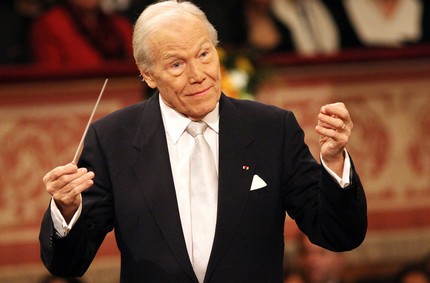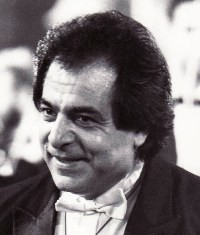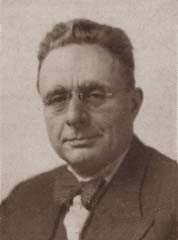
Жорж Претр (George Priest) |
George Priest

In recent years, the name of this conductor has increasingly appeared on the posters of concert halls and opera houses, on the covers of gramophone records, on newspaper and magazine pages. Georges Pretre is called one of the brightest representatives of the new conductor galaxy, a conductor of the modern type. Here is how one of the critics describes his appearance: “Georges Pretre is not only an unusually experienced conductor who knows his craft perfectly, but also an artist with strong nerves. His impulsive being radiates health… There is no touch of a romantic conductor’s halo. Pretre is a type of modern athletically built conductor who stands firmly on the ground; he is a passionate swimmer and rower, a dangerous judo partner. His blue eyes betray a Flemish origin, and his charm distinguishes a true Frenchman.
No matter how true these words are, the confirmation of which can be found in the biography of the artist, the main reason for his success, of course, is his outstanding conductor and musical talent. It manifested itself in childhood: from the age of eight, the boy began to play the piano, and then mastered playing the oboe and trumpet. When he was seventeen, he won first prize in an oboist competition, and then, as befits a “modern” musician, he became interested in jazz. Soon, Pretre was already known as a great jazz trumpeter. But he still had other, more serious plans. He went to Paris to enter the conservatory, in the conducting class, and … failed. The young man did not lose heart, he achieved a meeting with Kluytens himself, and he, after listening to him, enrolled him as a student.
Praetre studied the art of conducting at the Marseille Opera House, where, after graduating from the conservatory, he worked for eight years as an assistant conductor, and then as a second conductor. Starting with Iber’s opera “King of the City of Iz”, he soon mastered the entire repertoire of the theater, toured with the troupe in different cities and by the age of thirty headed the opera house in Toulouse.
In the mid-fifties, Pretre made his debut in Paris, conducting at the Opera Comique the operas All Women Do This by Mozart, Mignon by Thomas and Capriccio by R. Strauss. And soon the international fame came to the conductor, which is constantly growing. Pretr performs in Switzerland, Belgium, Germany, USA, Spain, England, Austria, where he tours twice at the invitation of Karajan himself; he conquers Parisians with a brilliant production of Faust at the Grand Opera, participates in many festivals, collaborates in performances and concerts with M. Callas and R. Tebaldi, and records on records. Thus, by the beginning of the 1960s, Praetre had become one of the leading conductors in his country.
Pretre’s creative interests lie primarily in the field of French music. He gained great popularity in his homeland with the premieres of Poulenc’s operas The Human Voice and The Lady from Monte Carlo and the renewal of his own Gloriana; Pretre’s repertoire includes operas and symphonic works by Gounod, Berlioz, Debussy, Ravel, and Messiaen. Among the best achievements of the conductor is the released recording of “Carmen” with the participation of M. Callas. Russian music also occupies a significant place in his repertoire; Critics especially appreciated his interpretation of “Eugene Onegin” and “Prince Igor”. The conductor also turns to other musical layers: his repertoire includes Mozart, Wagner, R. Strauss, and among the recordings, Dvorak’s Fifth Symphony, Stravinsky’s Symphony of Psalms, a number of works by A. Berg stand out.





